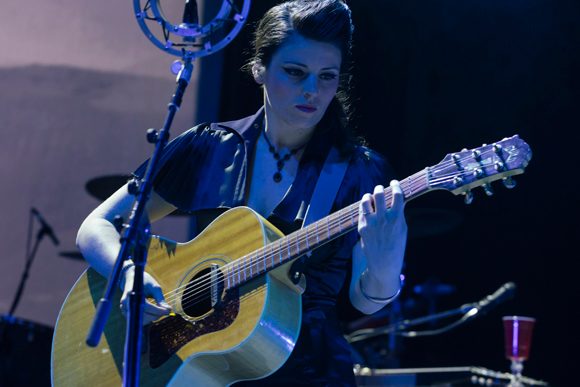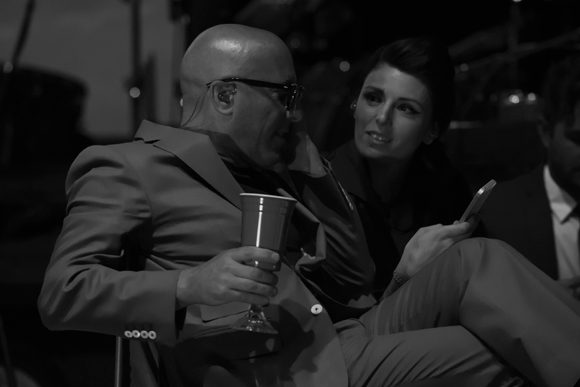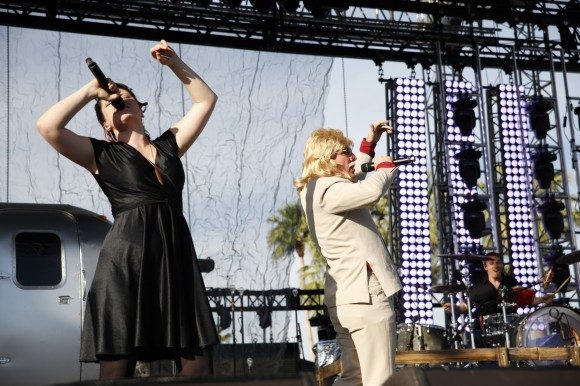

After a five-year absence, the Maynard James Keenan experimental-rock supergroup Puscifer made its return with “Apocalyptical.” The song was soon followed by the announcement of their fourth studio album Existential Reckoning, which was released on October 30th. We recently had a chance to speak with the longtime Puscifer band member, vocalist and guitarist Carina Round to discuss finding positivity amid Existential Reckoning, motherhood and the band’s recent live stream show at Arcosanti.
mxdwn: Was the new album written before the pandemic hit?
Carina Round: A lot of it was recorded before, particularly most of Maynard’s vocals were done in August of last year. We did the drums before the pandemic. I did a lot of my stuff during and also, Matt Mitchell did a lot of his guitars and stuff during and Greg Edwards put the bass on during the pandemic also. So a lot of the music was there that Matt had already done. He started doing that five years ago and that was basically it. Maynard put a couple of vocals on after the pandemic started, but it was like a mix. The pandemic hit right in the middle of us working on the record. We had about two weeks where nobody knew how COVID-19 worked, how you could catch it, how dangerous it was. So we just stayed safe and stayed home, but as information started to trickle in, Matt and I worked in a studio in LA where it’s basically two separate rooms. So we were able to work without touching each other and without being in the same room.
mxdwn: Was it difficult working on part of the album during COVID? What’s it like now that you are promoting the album?
CR: Well it’s harder in the sense that you can’t tour, that’s affected everybody. But everything else, for instance these kinds of interviews and all that stuff, it’s kind of easier in a way cause what the fuck else are you doing? You’re home. For me it’s been personally tricky because I have a three year old who I took out of school, finding time to do anything is impossible if you have kids. In lieu of going on tour, we just did that live streaming in Arcosanti, which we did in a COVID-safe environment. We had officers there making sure everyone was wearing masks and was tested. I think for most artists, it’s going to force us to figure out more creative ways of promoting our music including going on tour.


Photo Credit: Marv Watson
mxdwn: Existential Reckoning seems very topical for the state of our world right now, is there any positivity to be found inside these feelings of reckoning or is it largely dread?
CR: I think any positive feeling we can get is going to be down to what kind of person the listener is. For instance the last song, “Bedlamite,” one of the main lyrics is “everything’s gonna be alright” and another one of the lyrics is “raise a glass door heterogeneity.” You know, it’s basically saying as the human race we can withstand a lot. I also think that you know the way this pandemic is, for me anyway—I can’t speak for everyone obviously—it sometimes feels weird and uncomfortable talking about how this could have been a positive thing for some of us. Not trying to discount people who have lost loved ones and it’s been particularly difficult for them. But I feel that for many people, one thing that it did was it just deleted all of the noise. It distilled everything down to what was absolutely necessary in your life because you had no choice. You have to get rid of everything and focus on the things that you absolutely need. And I think that’s kind of good for us because we surround ourselves with a lot of nonsense.
mxdwn: With that in mind, and I understand this can be difficult to discuss, but Maynard James Keenan was diagnosed with COVID. Was the material for the new album recorded before that happened or after?
CR: No, because what happened was COVID hit while he was on tour with Tool and essentially ended that album cycle for Fear Inoculum. Which I am sure they will do something else when they can. I believe that’s when he had COVID… or he had it on the tour? Yeah, I remember reading something saying he had to do a show and then he came home. So, we had already recorded his vocals by that point, and he didn’t know what it was when he had it, thankfully, because he would have been scared shitless if he did. Yeah, he got it before anybody really knew anything about it.
mxdwn: The band has been around since 1995, what does the new record say about how far the project has come?
CR: Well, I think it’s the best record. And that’s not to say I don’t love the other records—the first record I wasn’t even involved in, and I love that record. That’s the record I listened to decide whether I wanted to be a part of it, and even then, I just thought it was unique. I was skeptical of it being Maynard’s side project and then I heard it and found it really interesting and cool. After I joined I was like “What the fuck is this? What are the rules?” I’m not used to not having boundaries and just setting myself all these rules. There just is none in this band and there is a sense of expect the unexpected. Then when you expect that, then it just becomes something else. I love that it goes with a sense of freedom and creativity. And I just, I don’t know, I feel like it’s evolved in that way. It’s never just an album, there is always some kind of other interesting thing going on, some cool multimedia thing or the live show. All the choices are made to bring another dimension to the music. It’s never just contained to an album and that, for me, makes everything else a bit boring because I’ve had this experience now where this project has made me understand that you can do whatever the fuck you want.
mxdwn: For those unfamiliar with why, can you explain why you chose to live stream the new record from the Arizona high desert at Arcosanti?
CR: Well I think it’s an important spot for Maynard because he lives there, and I think he is into the fact that it’s not an easy place to live or to be. There is always some manner of insect that’s trying to kill you or weird terrain or changeable weather, things like that. It’s just uncomfortable and like I said we could have chosen to do the live stream in a venue or theater or box or something like that but ultimately, the choice was to do it at Arcosanti and bring another dimension to music that’s already full of layering and mystery. And Arcosanti is such an interesting place because it’s filled with these beautiful concrete structures just mushroomed up in the middle of the desert in central Arizona. And I certainly never have seen anything like it before, it’s very unique and it feels a little bit like you’re on Mars waking up there. The idea of Paolo Soleri, I believe, was to try to bring the ancient land around the situation with the urban structure of the city, and try to bring those two things together in a way that it didn’t destroy either and made them both fully functional. And it has a big philosophy behind that city, it goes deep, and I just think that’s interesting in choosing that location.
mxdwn: Do you have any plans to continue with live streams?
CR: It isn’t ideal, but I think what we have to do is start looking at them as a different art form. It’s not live and it’s not an album; I feel like a good way to not be disappointed by these things is to just approach it as a completely different experience that is going to be a stopgap until we experience a live show again. And then probably in a lot of cases, it will continue to grow and evolve as a new industry. It’s gonna stem from the pandemic and not having a choice, but I actually think it’s really exciting. Like the things you can do. You know a lot more platforms opened up in order for artists to be able to do it. I actually love the idea of it, it doesn’t have to be a show and it’s not a video. It can be something in between, and that opens up a lot of doors for me, and that’s exciting!
mxdwn: What was your inspiration for the “Apocalyptical” video?
CR: For that, the lyrics and vocals were actually recorded in August or July or something of last year. And then, with the pandemic, it was like, “Well, we need to release this now obviously!” And that’s what we did. We had to do this green screen because nobody could be in a booth together, again because then nobody knew how to catch this thing and how we could protect ourselves. So it’s just me and the director of photography in a room, and Maynard did his part separately. I was just so happy that we captured those images of the streets, just a Los Angeles ghost town. One of the things I won’t forget is that at the beginning of the pandemic just going to the grocery store. I just had such an extreme emotional reaction to what it felt like just walking in there, all the shelves are empty, everybody’s wearing a mask and just terrified of being within 20 feet of another human being. Not knowing what the fuck is going on, everybody scared and it was such a crazy feeling, and I’m sure so many people experienced that. Just a real displacement and dissonance, just driving down the street it was eerie especially in a place like LA where traffic sucks all the time. So I thought it was important that that imagery was captured of this time. I think that’s something that will stick with people forever.


Photo Credit: Marv Watson
mxdwn: Do you have any other projects, aside from Puscifer, coming out soon or that you’re working on or any solo work that fans can look forward to?
CR: Yeah, I actually just put a lease on a room so that I can write my next solo record!
mxdwn: Wow, that’s exciting! Have you planned anything for it yet or is it just getting started?
CR: Yeah, it’s pretty exciting! Now’s the time right? I have a lot of ideas. I just bought an old 2600 which is this cool old synthesizer [Editor’s Note: she’s likely referring to the ARP 2600]. I want to try and experiment with ways of writing on an instrument that isn’t a guitar. You can get bored of yourself on the same instrument over and over again. Yeah, a lot of crazy shit personally happened to me over the last few years, so I’m hoping I can manifest some of that, even if I have to lock myself in a room and not touch an instrument for three months before I can reconnect with whatever it is that is in there. I’m certainly looking forward to that.
mxdwn: Is that what the writing process usually looks like for you?
CR: It’s certainly about showing up and being there and being present within the time that you are there. But, especially now, this is going to be a new experience for me because I have a child. My life is full in very different ways, I did a 180. For a while my priority 100% was nothing but work and music for my entire life, things kind of shifted a little bit over the last few years because I started a family and lost family members. It made for a big personal shift from extreme isolation, to having to look at my identity and what is it that makes up who I am and what is important. I’m always tentative to get into this because it only appeals to a very specific demographic of people. When you become a mother for the first time, for me anyway as an artist, it just completely isolates like for the first year or so. Just shatters who you think you are and your identity. I had a lot to contend with and right after, my mom died, so it was just a big fucking weird black bubble.
mxdwn: It’s been an isolating year as well, has it felt similar to the isolation of being a new mother?
CR: Actually, when it first happened a couple of people that I know that are also parents were like, “It’s kind of like that first year after you have a child.” And that is kind of how it feels, you are just completely in total isolation in your own head and questioning everything you’re thinking and doing and saying. Just an insane focus on these things that you’re doing, are they right or are they going to fuck something up forever? And the shifting of your priorities too, like that’s not even a choice. It just slows things down to what’s important.
mxdwn: Do you think it’s important to keep adapting as a band and as an individual artist?
CR: I think it’s important to be adaptable as a human. I consider myself a fighter from my upbringing to coming here, to how I got here and what I wanted to be doing. And I think Maynard and Matt are those kinds of people too. We all are just the kind of people that roll up our sleeves and do what needs to be done. And I think you have to be an adaptable person because even your day-to-day is not going to turn out exactly how you think it’s going to turn out. And I think if one of your priorities was making art, then it’s even more important to be adaptable because, in some cases, you are just going to have to make it happen in really adverse situations if you are eager to make what you want to make.
Featured Image Photo Credit: Marv Watson
